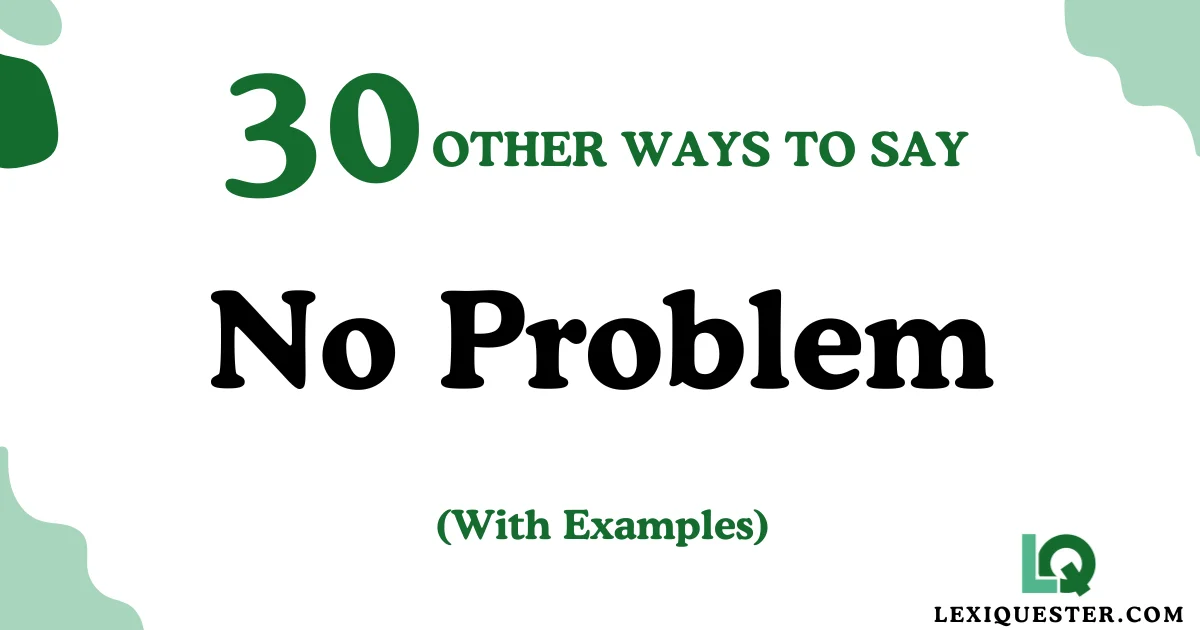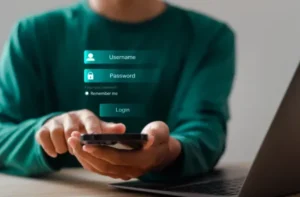Finding the right words to express ourselves can make all the difference in our conversations. Using alternatives to phrases like “no problem” not only enhances our communication but also adds a layer of warmth and care.
Whether you want to reassure a friend or respond to a colleague, these thoughtful phrases can make your message feel more personal and meaningful. Here are 30 alternative expressions that convey your willingness to help and keep the conversation flowing positively.
What Does “No Problem” Mean?
No problem is a casual phrase often used to indicate that something is not a burden or that you’re happy to help. It’s a way to assure someone that their request is manageable and that there’s no inconvenience involved.
When to Use “No Problem”
Use “no problem” when someone thanks you for assistance or when you want to convey that you are willing to help without any hesitation. However, there are many situations where a more empathetic or professional phrase might be better suited.
Is It Professional/Polite to Say “No Problem”?
While “no problem” is generally understood to be a friendly and informal response, it may not always come across as professional in certain contexts. For more formal situations or to convey more empathy, it’s often better to choose alternatives that reflect care and understanding.
No Problem Synonoyms
- My Pleasure
- Happy to Help
- No Worries
- Glad to Assist
- Of Course
- Absolutely
- Not a Problem
- You Got It
- Sure Thing
- Consider It Done
- I’m Here for You
- Don’t Mention It
- It’s All Good
- No Problem at All
- I’m on It
- Count on Me
- I’ve Got Your Back
- No Trouble at All
- I’m More Than Happy to Help
- Consider It My Honor
- It’s My Joy
- I’m at Your Service
- You’re Welcome
- I’m Glad to Help
- I’m Here to Help
- You’re in Good Hands
- Let Me Know How I Can Help
- I Appreciate Your Thanks
- I’m Always Here for You
- It’s Nothing
1. “My Pleasure”
Meaning: This phrase conveys that you enjoyed helping.
Definition: A courteous response that emphasizes the enjoyment of assisting someone.
Explanation: Saying “my pleasure” shows that you appreciate the opportunity to help.
Example Scenario: After someone thanks you for holding the door open, you can respond with, “My pleasure!”
Tone: Friendly and sincere
2. “Happy to Help”
Meaning: Indicates a willingness to assist.
Definition: A phrase that expresses your eagerness to provide support.
Explanation: This phrase makes it clear that you find joy in being helpful.
Example Scenario: If a colleague asks for assistance with a project, you can say, “I’m happy to help!”
Tone: Warm and supportive
3. “No Worries”
Meaning: Suggests that there’s nothing to stress about.
Definition: An informal way of saying that everything is fine.
Explanation: It reassures others that their request doesn’t cause any inconvenience.
Example Scenario: When a friend apologizes for asking for a favor, you can say, “No worries!”
Tone: Casual and relaxed
4. “Glad to Assist”
Meaning: Shows that you are pleased to help.
Definition: A professional response that highlights your readiness to support.
Explanation: This expression conveys a positive attitude towards helping.
Example Scenario: In a work setting, when asked for help, respond with, “I’m glad to assist.”
Tone: Professional and enthusiastic
5. “Of Course”
Meaning: Indicates agreement and readiness.
Definition: A phrase that confirms you are willing to help without hesitation.
Explanation: It’s a polite way to acknowledge someone’s request.
Example Scenario: When someone asks if you can join them for lunch, respond with, “Of course!”
Tone: Friendly and affirmative
6. “Absolutely”
Meaning: Emphasizes total agreement and willingness.
Definition: A strong affirmative response that indicates enthusiasm.
Explanation: It reassures others that their request is welcomed.
Example Scenario: If asked to help with an event, you could say, “Absolutely!”
Tone: Energetic and positive
7. “Not a Problem”
Meaning: Similar to “no problem,” but slightly more formal.
Definition: A phrase used to indicate that a request is manageable.
Explanation: It reassures the requester that their ask is reasonable.
Example Scenario: After someone thanks you for help, respond with, “Not a problem!”
Tone: Casual but considerate
8. “You Got It”
Meaning: A relaxed way to express agreement.
Definition: Indicates you are ready and willing to help.
Explanation: It conveys a friendly and approachable demeanor.
Example Scenario: When someone requests a favor, you can respond with, “You got it!”
Tone: Informal and laid-back
9. “Sure Thing”
Meaning: An informal way to express agreement.
Definition: Indicates you are happy to comply.
Explanation: This phrase conveys enthusiasm for the request.
Example Scenario: If a coworker asks for your input on a project, respond with, “Sure thing!”
Tone: Friendly and casual
10. “Consider It Done”
Meaning: Implies that the task will be taken care of.
Definition: A confident assurance that you will complete the request.
Explanation: This phrase boosts confidence in your commitment to help.
Example Scenario: When assigned a task, you could say, “Consider it done!”
Tone: Confident and assured
11. “I’m Here for You”
Meaning: Expresses emotional support and availability.
Definition: A warm phrase that assures someone of your help.
Explanation: It emphasizes your commitment to being supportive.
Example Scenario: If a friend needs to talk, say, “I’m here for you.”
Tone: Caring and compassionate
12. “Don’t Mention It”
Meaning: Indicates that the help provided was no trouble at all.
Definition: A humble response to gratitude.
Explanation: This phrase downplays the effort you put in.
Example Scenario: When someone thanks you for a favor, respond with, “Don’t mention it!”
Tone: Humble and friendly
13. “It’s All Good”
Meaning: Suggests that everything is fine and manageable.
Definition: An informal way to convey reassurance.
Explanation: This phrase indicates that you’re not bothered by the request.
Example Scenario: If a friend apologizes for bothering you, say, “It’s all good!”
Tone: Casual and easygoing
14. “No Problem at All”
Meaning: A variation of “no problem” that emphasizes your willingness.
Definition: An informal response to express ease in helping.
Explanation: This phrase assures others that their requests don’t inconvenience you.
Example Scenario: When someone asks for a favor, you can respond with, “No problem at all!”
Tone: Friendly and relaxed
15. “I’m on It”
Meaning: Indicates you will take action.
Definition: A phrase that shows commitment to fulfilling a request.
Explanation: This expresses readiness and determination.
Example Scenario: If a colleague assigns you a task, say, “I’m on it!”
Tone: Proactive and enthusiastic
16. “Count on Me”
Meaning: Expresses reliability and commitment.
Definition: A phrase that assures someone they can depend on you.
Explanation: This highlights your support and willingness to assist.
Example Scenario: When a friend asks for help with a project, say, “You can count on me!”
Tone: Trustworthy and supportive
17. “I’ve Got Your Back”
Meaning: Shows loyalty and support.
Definition: An informal way to assure someone of your help.
Explanation: This phrase expresses that you’re there for someone in need.
Example Scenario: If a friend is facing challenges, say, “I’ve got your back.”
Tone: Loyal and encouraging
18. “No Trouble at All”
Meaning: Indicates that assisting is easy for you.
Definition: A polite way to downplay the effort involved.
Explanation: This reassures others that their requests are welcome.
Example Scenario: When someone thanks you for a small favor, respond with, “No trouble at all!”
Tone: Polite and accommodating
19. “I’m More Than Happy to Help”
Meaning: Emphasizes your eagerness to assist.
Definition: A phrase that showcases a willingness to support.
Explanation: This expression conveys your genuine desire to be helpful.
Example Scenario: If someone requests your assistance, you can say, “I’m more than happy to help!”
Tone: Enthusiastic and friendly
20. “Consider It My Honor”
Meaning: Highlights your pride in being able to help.
Definition: A formal way to express joy in providing assistance.
Explanation: This phrase conveys deep respect and appreciation.
Example Scenario: When asked to speak at an event, respond with, “Consider it my honor!”
Tone: Respectful and sincere
21. “It’s My Joy”
Meaning: Indicates that you find happiness in helping others.
Definition: A heartfelt way to express your pleasure in assisting.
Explanation: This phrase conveys warmth and genuine kindness.
Example Scenario: When someone thanks you, you can say, “It’s my joy!”
Tone: Warm and heartfelt
22. “I’m at Your Service”
Meaning: Implies readiness to help at any time.
Definition: A formal and respectful expression of willingness to assist.
Explanation: This conveys dedication to serving others.
Example Scenario: If a customer asks for help, respond with, “I’m at your service.”
Tone: Respectful and professional
23. “You’re Welcome”
Meaning: A classic response to gratitude.
Definition: Indicates that you acknowledge and accept thanks.
Explanation: This phrase is courteous and widely understood.
Example Scenario: After someone thanks you, you can simply say, “You’re welcome!”
Tone: Polite and friendly
24. “I’m Glad to Help”
Meaning: Expresses pleasure in providing assistance.
Definition: A straightforward way to show willingness.
Explanation: This conveys your positive attitude towards helping.
Example Scenario: When someone thanks you for your help, respond with, “I’m glad to help!”
Tone: Friendly and sincere
25. “I’m Here to Help”
Meaning: Assures others of your availability.
Definition: A straightforward expression of your readiness to assist.
Explanation: This phrase highlights your supportive nature.
Example Scenario: When someone reaches out for help, say, “I’m here to help!”
Tone: Reassuring and supportive
26. “You’re in Good Hands”
Meaning: Implies that they will be well taken care of.
Definition: A phrase that emphasizes reliability and care.
Explanation: This reassures others that they can trust you.
Example Scenario: When someone is anxious about a situation, say, “You’re in good hands.”
Tone: Comforting and trustworthy
27. “Let Me Know How I Can Help”
Meaning: Indicates openness to assist further.
Definition: An invitation for further requests.
Explanation: This shows your willingness to offer additional help.
Example Scenario: After providing assistance, say, “Let me know how I can help!”
Tone: Open and inviting
28. “I Appreciate Your Thanks”
Meaning: Acknowledges the gratitude expressed.
Definition: A way to show that you value their appreciation.
Explanation: This phrase fosters a positive and reciprocal exchange.
Example Scenario: When someone thanks you, respond with, “I appreciate your thanks!”
Tone: Grateful and appreciative
29. “I’m Always Here for You”
Meaning: Emphasizes your continuous support.
Definition: A phrase that reassures someone of your reliability.
Explanation: This conveys that your help is always available.
Example Scenario: If a friend is going through a tough time, say, “I’m always here for you.”
Tone: Supportive and comforting
30. “It’s Nothing”
Meaning: Downplays the effort you put in.
Definition: A modest response to someone’s gratitude.
Explanation: This shows humility while acknowledging their thanks.
Example Scenario: When someone thanks you for a small favor, respond with, “It’s nothing!”
Tone: Humble and friendly
Conclusion
Choosing the right words can significantly enhance our communication, allowing us to express warmth, care, and understanding. By using these alternatives to “no problem,” you can make your conversations more personal and meaningful.
The next time someone thanks you or requests assistance, consider using one of these thoughtful phrases to strengthen your connection.
Recent Posts
- 30 Other Ways to Say ‘Happy to Hear That’ (With Examples)
- 30 Other Ways to Say “Nice to See You Again” (With Examples)
- 30 Other Ways to Say “Unfortunately” Professionally (With Examples)
- 30 Other Ways to Say ‘Looking Forward to Seeing You’ (With Examples)
- 30 Other Ways to Say ‘Happy Easter’ (With Examples)














